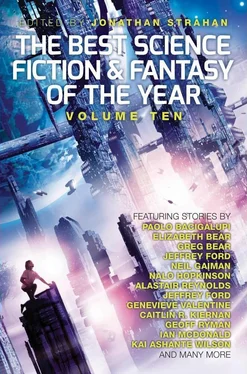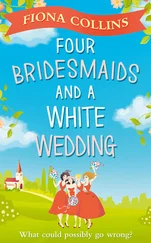In one scene the man sat in a mosque’s courtyard, performing ablution by the wudu tap. He wore a kurta and shalwar and Peshawari sandals. He was in his early twenties, lean, thickly bearded, with deep-set eyes that watched you impassively. In his hands he held a squalling baby whose tiny wrinkled fist was clenched around a stream of water from the tap. In the background a female face, familiar but older than I remembered, loomed over the courtyard wall, smiling at the pair.
The man was unmistakably Gramps, and the woman...
“Are you kidding me?” Sara leaned over and stared at the picture. “That’s the woman in the portrait hanging in his room?”
“He lied to me. To us all. She was my grandma.”
“Who is she?”
“Princess Zeenat Begum,” I said quietly.
Gramps had narrated the story of his life in a series of sketches and notes. The writing was in third person, but it was clear that the protagonist was he.
I imagined him going about the daily rituals of his life in Lahore after Princess Zeenat left. Dropping out of school, going to his father’s shop in the Niche of Calligraphers near Bhati Gate, learning the art of khattati, painting billboards in red and yellow, fusing the ancient art with new slogans and advertisements. Now he’s a lanky brown teenager wetting the tip of his brush, pausing to look up into the sky with its sweeping blue secrets. Now he’s a tall man, yanking bird feathers and cobwebs away from a eucalyptus stump, digging under it in the deep of the night with a flashlight in his hand.
And now – he’s wiping his tears, filling his knapsack with necessaries, burying his newly discovered treasure under a scatter of clothes, hitching the bag up his shoulders, and heading out into the vast unseen. All this time, there’s only one image in his head and one desire.
“He was smitten with her. Probably had been for a long time without knowing it,” I said. “Ruthlessly marked. His youth never had a chance against the siren call of history.”
“Hold on a sec. What was under the tree again?” Sara said.
I shook my head. “He doesn’t say.”
“So he lied again? About not digging it up?”
“Yes.”
“Who was he looking for?”
I looked at her. “My grandmother and her sisters.”
We read his notes and envisioned Gramps’s journey. Abandoning his own family, wandering his way into the mountains, asking everyone he met about a fig-and-orange farm on a quiet fir-covered peak in the heart of Mansehra. He was magnetized to the displaced Mughal family not because of their royalty, but the lack thereof.
And eventually he found them.
“He stayed with them for years, helping the pauper princess’s uncle with farm work. In the summer he calligraphed Quranic verses on the minarets of local mosques. In wintertime he drew portraits for tourists and painted road signs. As years passed, he married Zeenat Begum – whose portrait one summer evening he drew and painted, carried with him, and lied about – and became one of them.”
I looked up at Sara, into her gentle green eyes glittering above me. She bent and kissed my nose.
“They were happy for a while, he and his new family,” I said, “but then, like in so many lives, tragedy came knocking at their door.”
Eyes closed, I pictured the fire: a glowering creature clawing at their windows and door, crisping their apples, billowing flames across the barn to set their hay bales ablaze. The whinnying of the horses, the frantic braying of cattle and, buried in the din, human screams.
“All three Mughal women died that night,” I murmured. “Gramps and his two-year-old son were the only survivors of the brushfire. Broken and bereft, Gramps left Mansehra with the infant and went to Karachi. There he boarded a freighter that took them to Iran, then Turkey, where a sympathetic shopkeeper hired him in his rug shop. Gramps and his son stayed there for four years.”
What a strange life , I thought. I hadn’t known my father had spent part of his childhood in Turkey and apparently neither had he. He remembered nothing. How old was he when they moved back? As I thought this, my heart constricted in my chest, filling my brain with the hum of my blood.
Sara’s face was unreadable when I opened my eyes. “Quite a story, eh?” I said uneasily.
She scratched the groove above her lips with a pink fingernail. “So he digs up whatever was under the tree and it decides him. He leaves everything and goes off to marry a stranger. This is romantic bullshit. You know that, right?”
“I don’t know anything.”
“Left everything,” she repeated. Her mouth was parted with wonder. “You think whatever he found under the stump survived the fire?”
“Presumably. But where he took it – who can say? Eventually, though, they returned home. To Lahore, when Gramps had recovered enough sanity, I guess. Where his father, now old, had closed shop. Gramps helped him reopen. Together they ran that design stall for years.”
It must have been a strange time for Gramps, I thought. He loved his parents, but he hated Bhati. Even as he dipped his pen in ink and drew spirals and curlicues, his thoughts drew phantom pictures of those he had lost. Over the years, he came to loathe this art that unlocked so many memories inside him. And after his parents died he had neither heart nor imperative to keep going.
“He was done with the place, the shop, and Lahore. So when a friend offered to help him and his teenage son move to the States, Gramps agreed.”
I turned my head and burrowed into Sara’s lap. Her smell filled my brain: apple blossom, lipstick, and Sara.
She nuzzled my neck. The tip of her nose was cold. “He never talked to you about it? Never said what happened?”
“No.”
“And you and your family had no idea about this artistic side of him? How’s that possible?”
“Don’t know,” I said. “He worked at a 7-Eleven in Houston when he and Baba first came here. Never did any painting or calligraphy, commissioned or otherwise. Maybe he just left all his talent, all his dreams in his hometown. Here, look at this.”
I showed her the phrase that spiraled across the edges of a couple dozen pages: My killer, my deceiver, the Courtesan of the Mughals . “It’s Lahore. He’s talking about the city betraying him.”
“How’s that?”
I shrugged.
“How weird,” Sara said. “Interesting how broken up his story is. As if he’s trying to piece together his own life.”
“Maybe that’s what he was doing. Maybe he forced himself to forget the most painful parts.”
“Lightning trees. Odd thing to say.” She looked at me thoughtfully and put the journal away. “So, you’re the last of the Mughals, huh?” She smiled to show she wasn’t laughing.
I chortled for her. “Seems like it. The Pauper Prince of New England.”
“Wow. You come with a certificate of authenticity?” She nudged her foot at the book tower. “Is it in there somewhere?”
It was getting late. Sara tugged at my shirt, and I got up and carried her to bed, where we celebrated my return with zest. Her face was beautiful in the snow shadows that crept in through the window.
“I love you, I love you,” we murmured, enchanted with each other, drunk with belief in some form of eternity. The dark lay quietly beside us, and, smoldering in its heart, a rotating image.
A dim idea of what was to come.
I WENT THROUGH Gramps’s notes. Many were in old Urdu, raikhta, which I wasn’t proficient in. But I got the gist: discourses and rumination on the otherworldly.
Gramps was especially obsessed with Ibn Arabi’s treatise on jinns in The Meccan Revelations . The Lofty Master Arabi says, wrote Gramps, that the meaning of the lexical root J-N-N in Arabic is ‘concealed.’ Jinn isn’t just another created being ontologically placed between man and angel; it is the entirety of the hidden world.
Читать дальше












